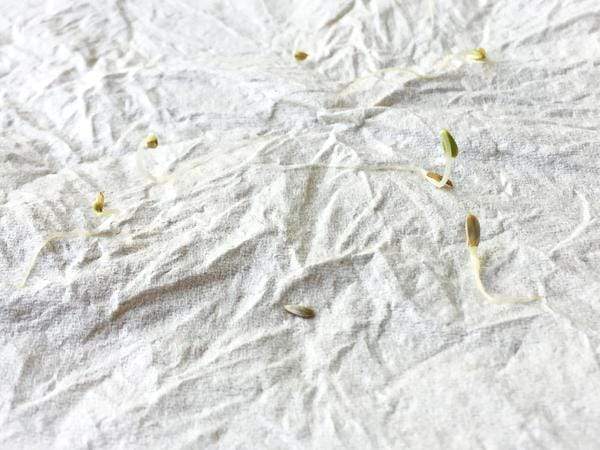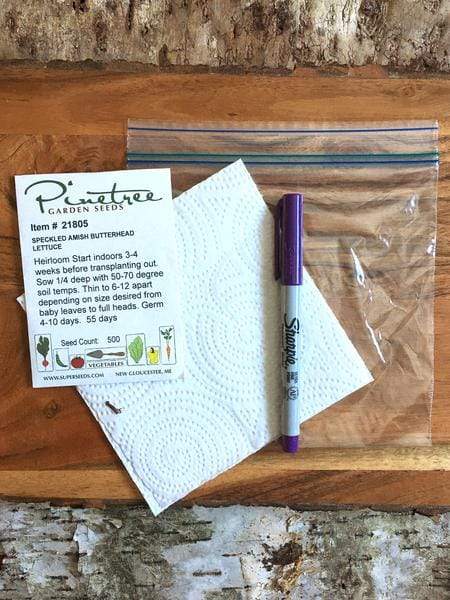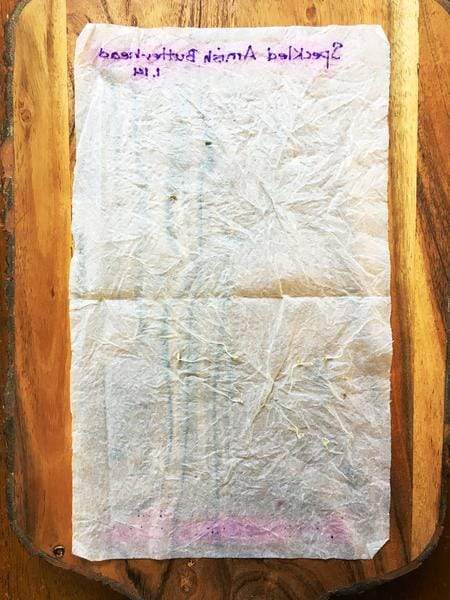GUEST BLOG POST
Hi there! This is Allison over at Finch + Folly and I am so happy to be partnering with Pinetree Garden Seeds today. I’m even more excited because Pinetree and I share the same beautiful hometown of New Gloucester, ME. If you follow me over on Instagram (@finchandfolly), you know that gardening here in the North can be challenging at times, so it always inspires me to see what’s growing over in Pinetree’s trial gardens. After spending the past two decades organic gardening, I have become quite picky as to where I buy my seeds. Maine’s growing season is fairly short, so I pretty much only get one opportunity at sowing some crops. Because of this, I need to know that the seeds I’m sowing will germinate. Sounds simple enough, but we’ve all been there…you sow a flat of seeds, give them all the love and care they require, and patiently wait for them to sprout…but they don’t, or just a few germinate from the many sown. I simply don’t want to risk that anymore, so I look to buy my seeds from companies that not only run their own trial gardens, but also actively test their germination rates regularly. Happily, Pinetree Garden Seeds does both and I can feel rest assured that the crops I sow will end up being crops I harvest.
Now, that new seed you just ordered this year will be all good to go in terms of germination. You may not know, but there are federal standards of seed germination for vegetables and many flowers. Pinetree only packs a seed if it is above the federal standard.
But, what about that big basket of seeds you have left over from last year? Chances are, those seeds still have a lot of growing to do, I just recommend testing out their viability first so you won’t have any germination heartbreak later. In a nutshell, seeds are alive, arriving to us in a dormant stage. When kept in proper storage condition, many seeds can stay dormant for years beyond their recommended used by date.
But there are a couple of factors that play into the viability of your seeds:
- Age — All seeds are viable for at least a year, with many others viable for definitely two years. After that, the seeds germination rate may start to drop off. It’s not to say that these are not viable seeds that won’t grow into healthy plants. They will. You just may need to sow more seeds than you think, as all will not germinate. See below for an easy way to test your seed’s viability.
- Variety/Type of seed — Certain varieties of plants have a shorter seed life by nature and are best used within one year. Examples of some short-lived seeds are: asters, delphinium, leeks, onions, parsley, parsnip, and phlox. While other plants have quite a long shelf life, like: basil, beets, Brussels sprouts, cabbage, chard, cucumbers, kale, lettuce, pumpkin, radish, squash, tomatoes and zinnias. Even within the same vegetable, you may encounter different germination rates for different varieties. Pelleted seed is best used within one year, as the pelleting process can reduce the seed’s longevity.
- Storage — Now this is key! Saving your seed properly is the first step towards your best germination success for next growing season. Unused seeds should be stored in a cool, dry location (ideal temperature of 50ºF at 50 percent humidity). Any exposure to heat, sun, or humidity can greatly lessen the seed’s viability. For home gardeners, your best storage bet is to put your seeds in a sealed glass container (must be moisture-proof) and store in your freezer or refrigerator. You can even tuck some rice in the bottom of your seed jars to help wick away any potential moisture. Properly stored seed can outlive their estimated viability by many, many years. A quick note: when taking your seed jars out of the refrigerator, allow them to come to room temperature before opening. This helps keep any potential condensation from forming.
And good storage isn’t just long-term, it’s your every day use of your seed packets when you’re outside sowing. I’ve been guilty of forgetting a packet or two of seeds out in the greenhouse (or sometimes, even right out on a garden bed). What I learned the hard way was, that by doing that, I damaged their probability of germinating by exposing them to high temperatures, sun and humidity.

While age, variety and storage are the main three factors, there are a few other items that can come into play for certain seeds to be able to germinate:
- Light — Some seeds need light to germinate, while others need dark.
- Pre-soaking and Scarification — Some seeds have tough outer seed coats that can make it tough for the seedling to break through. To soften that outer cover, you can presoak the seed overnight. You can also use sandpaper or a knife to gently scratch the seed coat, scarifying it, basically creating an opening for the seedling to emerge through.
- Cold Treatment — Some seeds need to be exposed to a period of cold prior to being able to germinate. How cold and for how long, all depends on the plant, but most can just be placed in the refrigerator for a few weeks prior to sowing.

When in doubt, test it out!
Your seeds definitely may have a little more kick in them than this list says, especially if stored properly.
Do a germination test to check your seed’s viability:
- Fold a dampened paper towel in half.
- Take 10 seeds & place on the damp towel.
- Fold the towel over the seeds & place in a zip lock bag in a warm location.
- After 3-5 days, open the bag and take a peek to see what’s germinated. Some varieties may take up to 10 days depending on the temperature and the type of seed, but this will give you a good gauge of how your seeds are doing.
If the germination rate is down, but there is still viability, simply sow those seeds out in the garden at a heavier rate, knowing that not all may germinate.

Below is a listing of the approximate life span of vegetable, herb, and flower seeds when stored properly. This is just an estimate. Many seeds have been viable for much longer, while some a bit shorter. It’s best practice to do a quick viability test to check your germination rate prior to planting when using older seed.
VEGETABLES:
Asparagus - 3 years
Beans - 3 years
Beet - 4 years
Broccoli - 4 years
Brussels Sprouts - 4 years
Cabbage - 4 years
Carrot - 3 years
Cauliflower - 4 years
Celery - 3 years
Chard, Swiss - 4 years
Chicory - 4 years
Chinese Cabbage - 3 years
Corn, Sweet - 2 years
Cucumber - 5 years
Eggplant - 3 years
Endive - 5 years
Kale - 4 years
Leek - 2 years
Lettuce - 4 years
Melon - 5 years
Mustard - 4 years
Okra - 2 years
Onion - 1 year
Parsnip - 1 year
Pea - 3 years
Pepper - 3 years
Pumpkin - 4 years
Radish - 4 years
Rutabaga - 4 years
Spinach - 2 years
Squash - 4 years
Tomato - 5 years
Turnip - 4 years
Watermelon - 4 years
HERBS:
Anise - 3 years
Basil- 5-7 years
Calendula - 3 years
Catnip - 5 years
Chives - 1 year
Cilantro - 5-7 years
Dill - 3 years
Fennel - 4 years
Lavender - 5 years
Oregano - 2 years
Parsley - 1 year
Sage - 3 years
Savory - 3 years
Thyme - 3 years
Flowers:
(As a general rule, most annual flower seeds are viable for 1-3 years and perennial seed for 2-4 years.)
Ageratum - 4 years
Alyssum - 4 years
Amaranth - 4 years
Aster - 1 year
Baby’s Breath - 2 years
Celosia - 4 years
Clarkia - 2 years
Coleus - 2 years
Cosmos - 3 years
Dahlia - 2 years
Daisy - 3 years
Delphinium - 1 year
Dianthus - 4 years
Foxglove - 2 years
Geranium - 1 year
Hibiscus - 3 years
Hollyhock - 3 years
Impatiens - 2 years
Larkspur - 1 year
Lobelia - 3 years
Lupine - 2 years
Marigold - 2 years
Nasturtium - 5 years
Nicotiana - 3 years
Pansy - 2 years
Petunia - 3 years
Phlox - 1 year
Poppy - 4 years
Salvia - 1 year
Snapdragon - 3 years
Sweet Pea - 3 years
Verbena - 1 year
Zinnia - 5 years
Happy germinating!


Thanks,useful site easy to navigate.
I’m in the San Luis Valley of CO, 7600 ft, so a shorter growing season (but area is a major producer of potatoes, have actual flavor due to great varieties, cool nights, etc.). I used to get Territorial Seeds catalog, which gave seed storage times, up in NW USA. THANKS for the info here. It really helps lots, and will try to print off that info, if possible. I’ve been gardening many long years, length of seed viability always an issue.
I have been hunting for a good explanation of the germination rates of various seeds for years now. I know I had a book that had a good explanation and I have not been able to locate it. you have given me the information I needed. Thank you so much for this wonderful, helpful article.
I have been saving seeds for a long time and I enjoyed your article on germination rate. I’ve had good success in saving seeds in my pill bottles. The important thing is making sure the seeds are totally dry.
I just want to say that even if a seed is supposedly too old to germinate, TRY IT ANYWAY. I just had success planting some Blue Boy cornflower seeds that I had from 19 years ago!!! I got huge beautiful plants and flowers. It is always worth a shot vs. just throwing them away. That is the biggest long-term germination success story I have ever had. They’ve just been in an envelope in a box all these years.